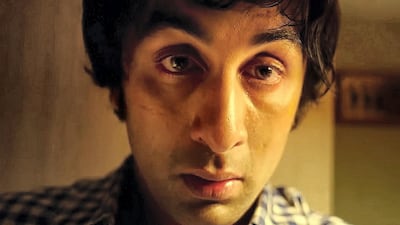Sanju has been raking in the cash since its release on June 29. And so it may seem out of place to begrudge something against the general public's verdict (clearly people love it), but if the Rajkumar Hirani-directed movie was promoted as a biopic of Sanjay Dutt, the film is anything but.
Ranbir Kapoor as Dutt and Vicky Kaushal as his friend Kamlesh Kapasi are the real show-stealers, as detailed in our movie review. Sanju is a tasteful film and, in Hirani's own words, it's "a great story waiting to be told."
It has indeed been presented nicely, but the question to ask is, how much did that 'great story' take shape or change shape in its telling? While understanding the need for creative liberty, the story of Sanju is an empty one and simply cannot be Sanjay Dutt's biopic without these must-have aspects listed below:
1. All-important women, all missing
You can skip flings and affairs in a biopic of a self-admittedly promiscuous actor, but how can two wives not be mentioned at all, while the third and current one gets all the credit for being a calming influence as Dutt battles for redemption in his latter years?
His first wife Richa Sharma died of a brain tumour in America, but spoke on record to being mentally harassed by rumours of Dutt planning to marry Madhuri Dixit. Dutt then married Rhea Pillai on Valentine's Day in 1998 after proposing to her on the same day. They got divorced in 2005, before Manyata Dutt became part of his life. Trishala, daughter of Richa, with whom Sanjay and Manyata spent New Year's Eve in Dubai, is completely missing too.
2. Where's Kumar Gaurav?
Dutt's career wouldn't have spanned nearly four decades and been the legendary the story it is had it not been for Kumar Gaurav. Not only was he a friend to Dutt, he risked his own career with the making of 1986 film Naam - a story of two half-brothers where one strays away. Son of a popular actor himself, Gaurav asked his father Rajendra Kumar to cast Dutt as the brother, putting his neck on the line. That's what happened. Sanjay got a fresh lease of life, while Gaurav's career faded away. Gaurav married Dutt's sister Namrata in 1987, and they live in the same building even today in Mumbai. (Incidentally, Naam also happened to launch Paresh Rawal, who plays Sanjay's father Sunil Dutt in Sanju.)
3. One character, many people
While it was Gaurav who stood by Dutt in his fight against drug addiction, the credit for this is entirely missing in the movie. Instead, it's the fictional character of Kamlesh that is the constant face of support. In reality, Dutt has a group of friends, including one who is indeed based in the United States a la Kamlesh. That is Paresh Ghelani, but the others - Raj Bansal, Ajay Arora, Pradeep Singh, Ajay Marwah – have been rolled into one.
______________________
Read more:
Watch: First glimpse of Saaho showcases Prabhas and Abu Dhabi
'I would love to play a dark character': Chitrangda Singh on #MeToo and roles for women in Bollywood
Review: Sanjay Dutt simmers in Saheb, Biwi aur Gangster 3
5 Weddings: The Bollywood-Hollywood movie that nearly didn't get made
______________________
4. Writer's block
Ghelani, or Paria as Dutt calls him, did make the trip from Los Angeles in 2016 to be there in person when Dutt finished his jail sentence as shown. In the film, though, it is a writer Winnie Dias (Anushka Sharma) who helps to clear a misunderstanding between Kamlesh and Sanju (that had led to a two-decade-old falling out). That's an incident that added little to the movie, but left a lot of integrity missing from the plot. It also speaks badly of Hirani and Abhijaat Joshi, who co-wrote the script.
5. There's a lot of media-bashing, as per usual
Initially, the hint is subtle. But by the end, Dutt turns up himself and says it is the media who messed up his life and implied he was terrorist by only quoting sources and allegations. In Sanju, Dutt's early drug problems are met with a sympathetic tone, with anecdotes of a star kid overwhelmed by his father's legacy to evoke sympathy. But where cracks cannot be papered - such as his marriages and trouble with crime - it is the media who influenced the terrorist tag.
But Dutt forgets that he was forewarned by a journalist himself, even before the latter broke the story of him possessing a rifle. Baljeet Parmar, a former colleague of yours truly, is on record to state that Dutt wanted to know the implications while shooting in Mauritius in full knowledge that police were waiting for him.
He was told that if he surrendered, he would be tried under the Arms Act, but if not and is arrested, he would be tried under the stern Terrorist and Disruptive Activities Act (Tada) with no bail, as legal luminaries had predicted as well. Dutt’s phone calls were tapped, and he opted to return pretending nothing had happened.
Dutt's confessional statement to police also was not a media creation, nor has he denied the fact that he kept a cache of arms in his house. He said he wanted a gun for the safety of his family but already had three which he used for shooting.
On the day of Sanju's release, Rawal said that nothing in the film is a whitewash or propaganda. But by blaming things on the media, omitting sticky points or presenting them in a new way, Sanju is certainly not a biopic. And it's a flawed story, too.
_____________
Read more
Film review: Sanju is an emotional tribute to the Dutts
Why artists in India are leaving Mumbai for tiny fishing village Madh Island
Inside Akash Ambani's truly lavish engagement party
Sanju: What to expect, and not, from Sanjay Dutt's biopic
_____________


